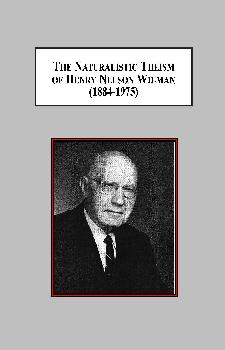Naturalistic Theism of Henry Nelson Wieman (1884-1975). The Creator of an American Process Theology
We are currently unable to ship to the EU countries at this time. We apologize for this inconvenience.

| Author: | Rich, Charles Mark | |
| Year: | 2012 | |
| Pages: | 432 | |
| ISBN: | 0-7734-2924-7 978-0-7734-2924-6 | |
| Price: | $259.95 + shipping | |
| (Click the PayPal button to buy) | ||
Henry Nelson Wieman was one of the most influential American religious figures of the late twentieth century. His work is examined here in relation to other notable thinkers such as Henri Bergson, William James, James Dewey, Alfred Whitehead, and Josiah Royce among others. He was also a mentor of Dr. Martin Luther King Jr. and his work set the stage for naturalistic theism. Wieman believed that creative religion constituted by self-giving individuals must always exist in relation to divine cosmic individuality. A radically individual nature of the process of change means that religion must encourage collective actions towards justice through an appeal to the individual rather than the group. What calls the subject to action is co-related to what the individual perceives as a totality of lived experiences.
Reviews
“This book will stimulate a renewed examination and appreciation of Wieman’s insights as they pertain to mankind’s situation in the 21st century.”
-Prof. Doyal O’Dell,
University of Chicago
“In Wieman’s thinking, the human and the divine have an interactive relationship. Rich’s book has a clear explication of Wieman’s thinking which makes such an interactive relationship understandable within the physical universe as we know it.”
Prof.Tadashi Kikuchi
-Prof. Doyal O’Dell,
University of Chicago
“In Wieman’s thinking, the human and the divine have an interactive relationship. Rich’s book has a clear explication of Wieman’s thinking which makes such an interactive relationship understandable within the physical universe as we know it.”
Prof.Tadashi Kikuchi
Table of Contents
Foreword by Doyle O’Dell
Part One: Discovering a Life Quest
Chapter One: Introduction: Building an Academic Career
Chapter Two: A Park College Education
Chapter Three: Seminary, a Year in Germany, and Four Years in the Pastorate
Part Two: To Harvard for Graduate Study
Chapter Four: Defining the Greatest Good within a Naturalistic Value Theory
Chapter Five: Defining the Greatest Good as Creative Process
Chapter Six: A Philosophy of Religion and a Metaphysics of Community
Part Three: Intellectual Alliances and Divergences
Chapter Seven: Wieman’s Response to Whitehead’s Philosophy of Nature
Chapter Eight: The Nature and Nurture of Religion
Chapter Nine: Wieman’s Divergence from Whitehead
Chapter Ten: Wieman’s Response to Dewey: An Instrumentalism Directed by Creativity
Chapter Eleven: Wieman and Dewey on Value and Religion
Chapter Twelve: The Absolute Commitment of Faith
Part Four: The Challenge of the Future
Chapter Thirteen: Affirming the Foundations of Naturalistic Process Theism
Chapter Fourteen: Defining the Creative Event
Chapter Fifteen: A Vision of Transformation of Selfhood and Culture
Chapter Sixteen Postscript: What of the Future?
Part One: Discovering a Life Quest
Chapter One: Introduction: Building an Academic Career
Chapter Two: A Park College Education
Chapter Three: Seminary, a Year in Germany, and Four Years in the Pastorate
Part Two: To Harvard for Graduate Study
Chapter Four: Defining the Greatest Good within a Naturalistic Value Theory
Chapter Five: Defining the Greatest Good as Creative Process
Chapter Six: A Philosophy of Religion and a Metaphysics of Community
Part Three: Intellectual Alliances and Divergences
Chapter Seven: Wieman’s Response to Whitehead’s Philosophy of Nature
Chapter Eight: The Nature and Nurture of Religion
Chapter Nine: Wieman’s Divergence from Whitehead
Chapter Ten: Wieman’s Response to Dewey: An Instrumentalism Directed by Creativity
Chapter Eleven: Wieman and Dewey on Value and Religion
Chapter Twelve: The Absolute Commitment of Faith
Part Four: The Challenge of the Future
Chapter Thirteen: Affirming the Foundations of Naturalistic Process Theism
Chapter Fourteen: Defining the Creative Event
Chapter Fifteen: A Vision of Transformation of Selfhood and Culture
Chapter Sixteen Postscript: What of the Future?
